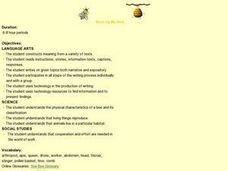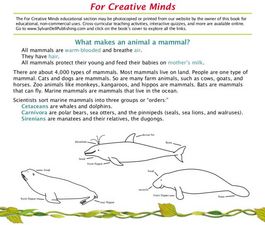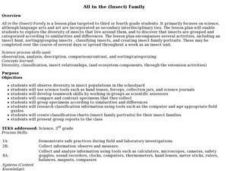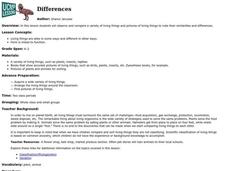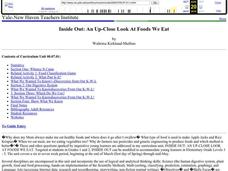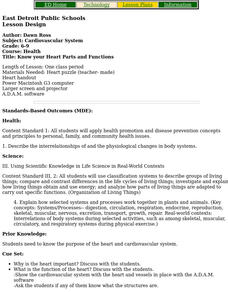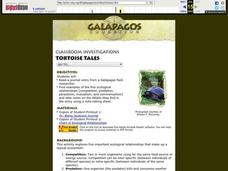Curated OER
Buzz Up My Hive
Students research bees. In this organisms lesson, students participate in various learning centers to find out more about bees. The centers include watching a video and taking notes, reading books about bees, and going on a WebQuest. As...
Curated OER
Reading on the Farm
Second graders study farm life. In this writing lesson, 2nd graders listen to "Pigaroo" and write their own story about farm life.
Curated OER
Food webs and Energy Flows
Students become familiar with food chains. In this food chains lesson, students understand that as consumers eat other consumers energy is passed. Students understand the vocabulary associated with food chains.
Curated OER
Adaptations To the Environment
Learners design and construct an imaginary animal that is perfectly adapted to a particular type of biome. They give the animal a scientific name, place it in a phylum and write descriptions about its behavior, reproduction, foraging,...
Curated OER
For Creative Minds: What Makes an Animal a Mammal?
Students read about categories of mammals and their features. Students then construct a marine animal, using given print outs in the lesson. Students then create adaptations for their mammal, using a web site reference for guidance.
Curated OER
Little Me in a Big World: Ants
First graders predict, observe and record strategies to overcome them using discussions, role play, and charts. Over a three or four day period, they examine obstacles that humans and insects encounter.
Curated OER
All in the (Insect) Family
Young scholars participate in a series of activities in order to explore the diversity of insects. They explore how insects are grouped and categorized.
Curated OER
What's A Mammal?
Students examine mammals understanding what a mammal is and reviewing the eleven mammal groups. In this science lesson, students play a game known as Mystery Mammal Game. Yet, first students research about the mammal and then give...
Curated OER
Differences
Learners observe and compare a variety of living things and pictures of living things to note their similarities and differences.
Curated OER
Holy Habitats or Meet Metamorphosis
Students examine the metamorphosis of frogs and how it adapts to its environment. They research how world pollutants are effecting the amphibian population.
Curated OER
Shells
Sixth graders label diagrams of the 6 different classes of mollusks and explain the meaning of the labeled terms. They identify 8 common New Haven shells. They organize their own shell collection during this series of lessons.
Curated OER
Honey Bee Biology
Learners review the basic parts of an insect and explore the anatomical characteristics of a honey bee. The second part of the lesson focuses on ways to identify a honey bee from other stinging insects.
Curated OER
Classifying Living and Non-Living Objects
Students investigate living organisms and define the properties of a living species. In this life characteristic lesson, students examine plants in their class and discuss whether or not they are alive. Students create a living vs....
Curated OER
Inside Out: An Up-Close Look At Foods We Eat
Fourth graders identify the origins of meats and vegetables consumed by humans on a daily basis. They classify foods (meats, dairy products, grains...) and create a food pyramid.
Curated OER
Constructing A Food Web
Students identify and explain the relationships within a food web. They use index cards to glue pictures of producers and consumers. On the back of the card, students name the organism, list the type of biome in which it is found.
Curated OER
Shared Reading: Wishy-Washy Day
Students experience two pieces of literature that discuss the importance of taking a bath.
Curated OER
Stop the Bleeding
Pupils explore various parts of the heart and blood vessels . They begin with an overview of the components of the cardiovascular system. They see a cross section of an artery and watch how a blood clot develops.
Curated OER
Aerobic and Anaerobic Conditioning
Students view the A.D.A.M. computer simulation of aerobic and anaerobic exercise. They break into groups and members brainstorm and list as many aerobic and anaerobic exercises as possible in five minutes.
Curated OER
Know your Heart Parts and Functions
Students put together a 3-D interactive "heart" puzzle and learn the names of heart parts.
Curated OER
It's Alive
First graders critically analyze living and nonliving objects, then develop a list of characteristics to classify objects on a science walk. They make a book to close out the lesson.
Curated OER
Building a Dichotomous Key
Students analyze how a dichotomous key helps us explain and identify unknown organisms. They design and construct a dichotomous key, developing a list of three observable characteristics per organism.
Curated OER
Tortoise Tales
Learners read journal entry from a Gal??pagos field researcher, find examples of five ecological relationships (competition, predation, parasitism, mutualism, and commensalism) and take notes on the details they find in the entry using a...
Other popular searches
- Taxonomy of Animals
- Animals Classification
- Classification Animals Virus
- Taxonomy of Animals Saluki
- Animals Classification Chart
- Taxonomy of Animals Salk
- Plants Animals Classification


